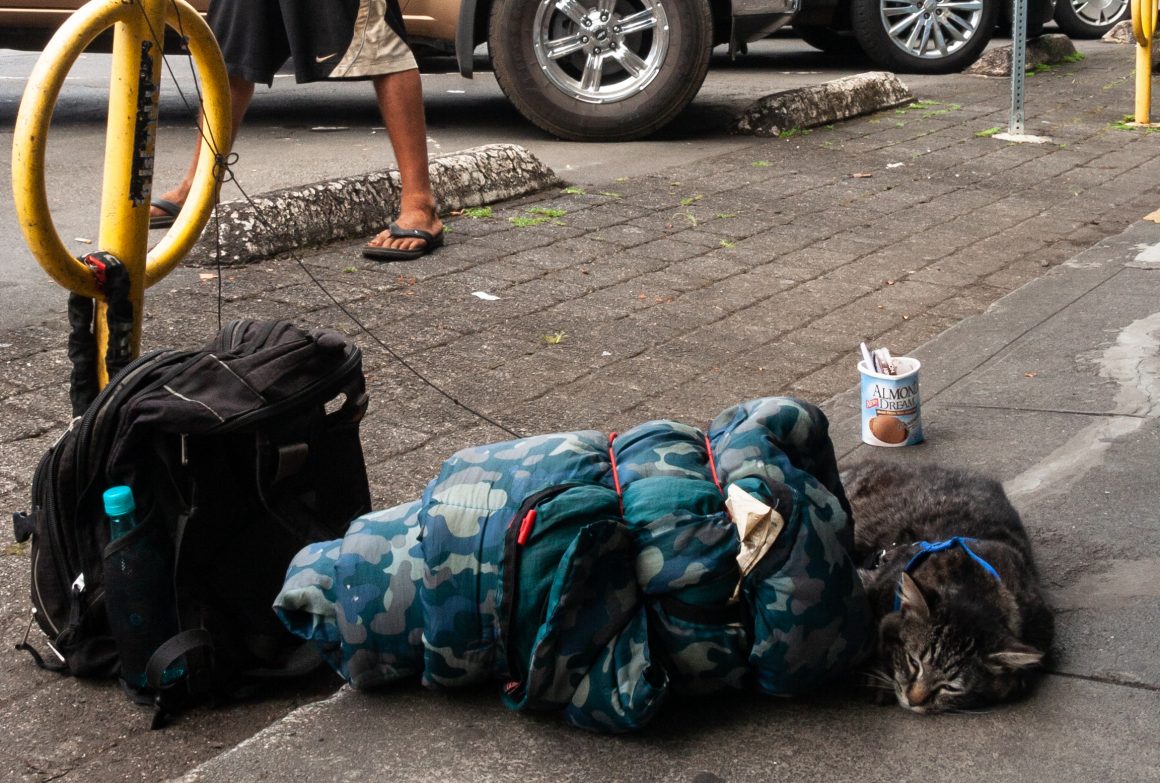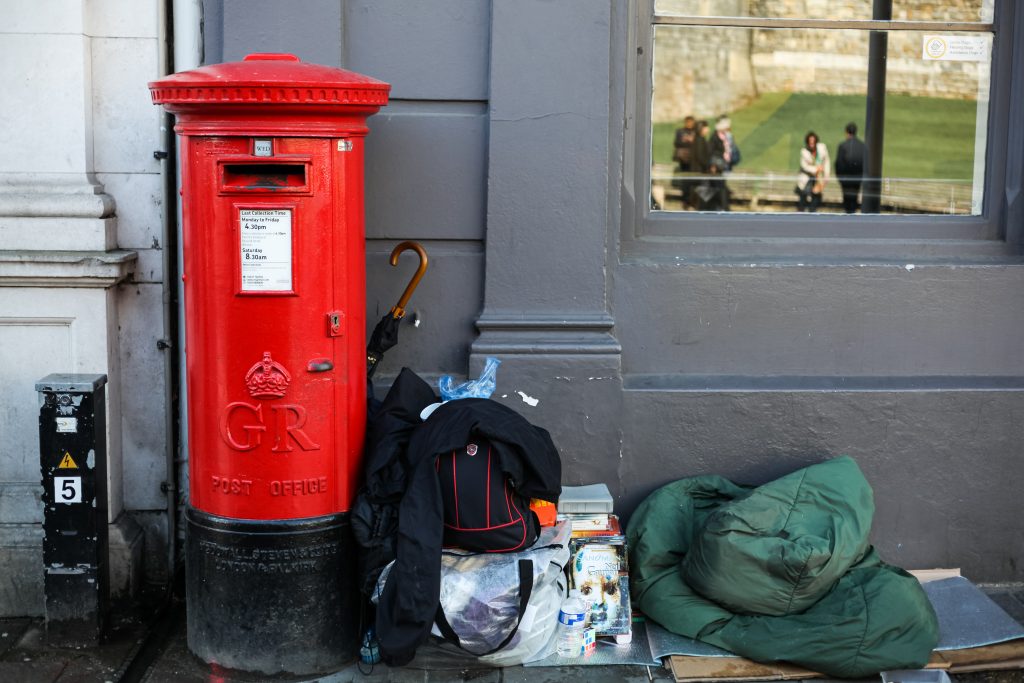
Why the homeless need homes, not charity: A case for public action on homelessness
By Christian Lowry, October 29 2020—
For most of us, homelessness is a passing eyesore, a momentary pang of pity, a societal error that doesn’t compute. It is something we choose not to acknowledge in order to continue living the predictable, carefree existence that all people desire. With the onset of the coronavirus pandemic, however, we must sooner or later reckon with it. In Canada, the rate of homelessness is 50 per cent higher than the average figure for other member states of the Organization for Economic Cooperation and Development. The average age of death for a homeless person in Canada is 40 years, compared to 83 years for the rest of the population. The problem is what the writer George Jackson once called “poverty among plenty” —currently, there are ten vacant homes for each chronically homeless individual within our borders.
Nor is the problem limited to our own country. In the United States, 553,000 people were considered to be chronically homeless in 2018, and another 2–3 million experienced homelessness during the year. In the midst of the 2020 coronavirus pandemic and the resulting economic collapse, only a full moratorium on evictions issued by the US Centers for Disease Control and Prevention (CDC) stands between 40 million American renters and sleeping rough. Nobody knows what will happen after the CDC moratorium expires on Dec. 31, when winter is in full swing.
Our vulnerability as a society has been laid bare by the ongoing pandemic. The fact that millions of people like ourselves are only a few paychecks away from needless suffering means that, although they are necessary and appreciated, charity and stopgap government orders are not the solution to such a widespread social ill — a dramatic reappraisal of the way we treat housing, and those without it, has been in order for some time.
Many of us prize our civil liberties to worship, speak, think, write, travel, assemble and express ourselves. Most of us are only able to devote time to these pursuits only because we are not worried about where we will return to when we are done. One’s shelter is not something to be gambled away by the onset of sudden illness, rent hikes, unemployment, disability or anything else, most of which are beyond an individual’s control to foresee or prevent. It is extremely crucial to human well-being in its own right. The existence and location of one’s housing is a major factor in choosing one’s work and thereby earning one’s means of living. Housing gives people a secure place to rest and recuperate, a way to ground themselves in a community and shelter from both the elements and other people. In both ways, it is a guarantee of physical security and personal sustenance. Housing is an essential prerequisite for privacy, since it is a nearly inalienable space in which, and from which, to pursue one’s interests. It is a secure place from which one can safely engage in work, recreation or social interaction. To deny somebody a home is to deny them the rights and freedoms of personhood.
Generally, the issue of homelessness has been addressed by private charities, staffed by dedicated volunteers and funded by donations. Participation in charity is a praiseworthy act. Charity helps whoever it helps, but the help is inadequate and unpredictable by its very nature. Individuals, acting only occasionally, in isolation from each other and with only their own resources, are only capable of doing so much. Charities also have high administrative costs due to their relative inexperience, small size and the need to compete with others for attention through advertising. Instead of making the basic needs of all people society’s highest priority, charity turns the satisfaction of those needs into a fraying lifeline that may be reeled in at one’s own discretion. Another deficiency is that in order for charity to exist, the problem it addresses must be allowed to exist first. Thus, homeless people are expected to live on the streets for long periods of time and succumb to dependence on drug addiction, alcoholism, begging, crime, illness and countless other travails before they merit our pity and assistance.
If people have a right to life and liberty, as we usually acknowledge, then they also have a right to whatever they need to preserve life and liberty. What is required to end homelessness is a guaranteed, universal right to shelter to be ensured by the government. This model of combating homelessness, known as “Housing First,” uses shelter as the first step in the elimination of homelessness and its resulting problems, rather than as a reward at the end of a moralistic process.

It is often assumed that the root causes of homelessness are ones of personal shortcomings, but that is not the whole story. The homeless do not set the availability of work or housing, their wages, their rent, their medical costs or their disabilities. In addition, even if the advocates of greater “personal responsibility” were correct, the despairs of street life, such as crime, substance abuse, worsened mental or physical illness, hunger, cold, lack of money and the constant contempt or pity from society only compound their individual flaws and prolong their vulnerability on the street. Even if we granted the argument, it would only increase the importance of public action.
It costs far less to give somebody a modest apartment than it does to continually treat them in hospitals, to police them, to donate to inefficient, unaccountable charities and to ultimately put a roof of sorts over their heads in the prison system. A 2005 study of homelessness strategies in four Canadian cities showed that the annual cost of sheltering a homeless person in basic affordable housing was $5,000 per capita, compared to $13,000 per capita in drop-in shelters and $66,000 per capita in prisons or psychiatric institutions. Further, at present, we do not know for certain if we will end up homeless in the future, so it is in our best interests to preempt homelessness for all. In that vein, the political philosopher Thomas Paine wrote in 1795, “He that would make his own liberty secure, must guard even his enemy from oppression; for if he violates this duty, he establishes a precedent that will reach to himself.”
Moreover, governments do not suffer the same institutional disadvantages as charitable organizations. If they so choose, they can lower administrative costs by imposing a monopoly on a given service, which would eliminate the need to raise awareness of a cause through competitive advertising. They can hire more employees from all necessary trades, apply a single, uniform standard to service provision and provide a stable, adequate and guaranteed source of funding. Government action is also binding and immediate, and therefore can quickly provide goods and services to the needy ensuring they do not suffer preventable harm for long periods of time before empathetic citizens take notice of their plight. It is easier to prevent a problem from emerging than it is to solve it once it does.
Some countries, such as Finland, have implemented “Housing First” strategies at the national level. The Constitution of Finland obligates the national government to provide shelter for its citizens. Public housing comprises 13 per cent of Finland’s housing supply, compared to only two per cent in Canada, and the life expectancy of Finland’s homeless population is 57 years, as opposed to 40 years in British Columbia, the sole province for which Canadian figures are available. The result is that Finland’s homelessness rate is limited to 0.10 per cent of the population, compared to 0.17 per cent in the United States and 0.36 per cent in Canada. Applying the example of Finland to Canada should not be particularly difficult, since both are developed, post-industrial, high-income countries.
Inevitably, some people suffer such severe deprivation that the social programs that uplift most homeless people will not necessarily provide adequate assistance for all. With regard to the increasing rate of poverty reduction globally, World Bank researcher Francesca Ferreira has cautioned that “the pockets of poverty that remain will become increasingly harder to reach and address.”
Nevertheless, as with any aspect of public policy, the goal is not to achieve perfection, but to markedly improve the standard of living for the people as a whole. Not all threats can be prevented, but many can. If Canada chooses to pursue such a path in order to uplift the homeless, it will make a major improvement in their lives and prevent us from suffering their plight. Going forward, the question is merely one of political will.
This article is part of our Opinions section and does not necessarily reflect the views of the Gauntlet’s editorial board.
